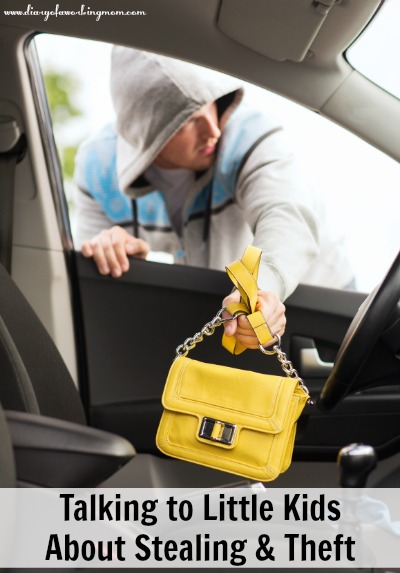 Photo courtesy of istockphoto.com
Photo courtesy of istockphoto.com
When my purse was stolen last week, I was in shock. When I realized that my daughters’ iPad (technically it was mine, but they always seemed to think otherwise) had also been stolen as well, I was devastated. Not over the loss of the iPad in general – a pricey item – but because my kids were going to be distraught. They had all their favorite shows and games saved on there; it was an item that they used almost everyday. If it had just been my purse that was stolen, I probably wouldn’t have even told the kids what happened, but once I realized that the iPad was gone, I knew I was going to have to explain where it went. And, honestly, I wasn’t quite ready for that conversation. Sure, we’d talked about our things vs. other peoples’ things and not taking items out of other kids’ hands, but we never had a talk about an unknown person taking our stuff…and keeping it.
I’ve learned a lot through this experience. Below are a few tips on how to talk to your kids about stealing and theft – some that I knew before we started talking to the girls, others I wish I knew. And if you’re going through this – hang in there!
Set aside some time to talk. Before your kids go looking for the missing items, sit them down and talk about what happened. Don’t rush it. Leave time for questions…because there will be plenty. Stay calm and – even if it’s the only time that you do it – look for the silver lining in it all (you’re okay, they’re okay, you still have so many other things). Ask them how they feel about what happened and understand that their emotions can range from anger to tears to ambivalence.
Try to avoid words like “bad people” or “bad guy”. Instead, stick to words like “someone” or “a person”, i.e. “Someone stole the iPad today” NOT “A bad man stole the iPad today”. Yes, we all know these people are bad, but when I used the words “bad man” to explain who took our stuff, my kids got scared…and they thought the bad people were after us. While the word “bad” has a fairly watered-down connotation for adults, it’s a serious word for little kids. It might be the worst word they know (and actually understand). Instead, stress that the thief is someone who makes “bad choices”. Use the discussion to elaborate on stealing and other bad choices (hitting, biting, gossiping, etc.).
Be ready for questions. It’s been 10 days since this all happened and I still get 5+ questions every day about what happened to my purse, what happened to my money, what happened to my iPad, etc. I don’t expect these questions to end anytime soon. Admittedly, it’s a little frustrating to answer the same questions everyday (and relive it a bit while I answer them), but it’s part of the process for little kids. Have patience and use these question and answer periods to gauge their feelings on the event (has your child gone from sad to scared or ambivalent to angry?).
Present stealing in many formats. Even after a lengthy conversation and lots and lots of questions, some kids still might not understand. My kids didn’t. I highly recommend using a book, television show, or movie that illustrates stealing/theft on their level. For us, that was Joy Berry’s Help Me Be Good About Stealing. It was actually a book that was read in my kid’s school, and they came home and told me about. While it isn’t the exact same type of situation, it broke “stealing” down into a concept that they could understand.
Notify your child’s teacher and work with their school. I first notified the kids’ school the day my purse went missing, simply to tell them that I had to shut down our bank account (thus voiding the check that I wrote them days before). Although it wasn’t my original intention, doing so also put the teachers on notice that my girls might need a little extra attention in the following days. Turns out, my oldest daughter told her teacher she was scared about the whole event, something she never told me. Having open communication with the school and their teachers allowed us to work on the situation as a team, providing the support the girls needed.
Make it a learning experience. Explain to your child that they way they are feeling about their stolen belongings is how other kids feel when your child takes their belongings. Use specific examples of when they took something from their friend, classmate, or sibling without permission and ask how that probably made the friend, classmate, or sibling feel.
Have you had to talk to your kids about theft? What worked for you?


I agree with this, especially using the word “bad” in association to who the person was. I have noticed I’ve used that word before and my toddler looked frightened. Awesome advice, thank you!
I do not have children but do agree totally with all you are recommending. I am not surprised that your daughter spoke to her teacher about her fears–there have been times when my friends children have come to me instead of their parents. I’m not sure why that is-thankfully the teacher knew just how to answer and help!
I’m so sorry this happened to you! We have been fortunate to not have had to go through this situation. Thank you for the great tips in case we ever do.
We’ve not really had the talk with our children, I mean we’ve told them (well our oldest one) that it is wrong to steal and that you’ll go to jail if you do it. We’ve also explained that if he steals from us we’ll have our neighbor arrest him immediately (he’s a cop). He understands to some extent, but he’s only going on 9.
These are great tips! My children learned from early on that it’s not okay to take things that don’t belong to them.
This is fantastic advice. I’m so sorry this happened to you!
Wow! So sorry that happened to you. It is very hard to teach kids life lessons like these and these are some fantastic tips and steps in having that conversation and life lesson. Thanks for the ideas, my youngest are 3 and 6 and they are getting to that age where it is crucial they learn and fully understand this.